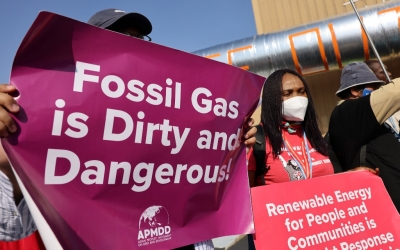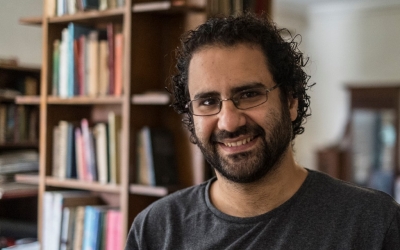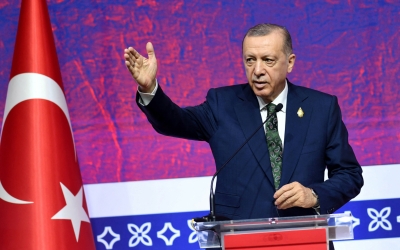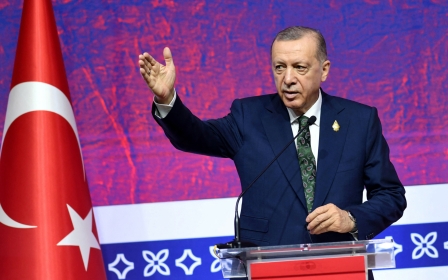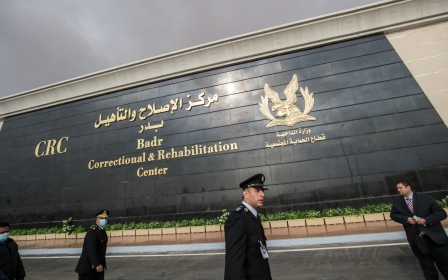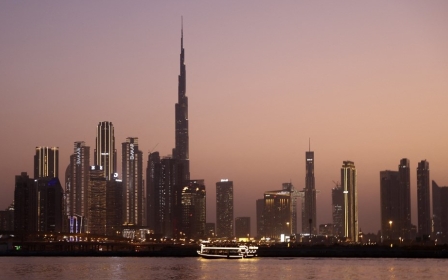Cop27: What happened in Egypt and what was decided?
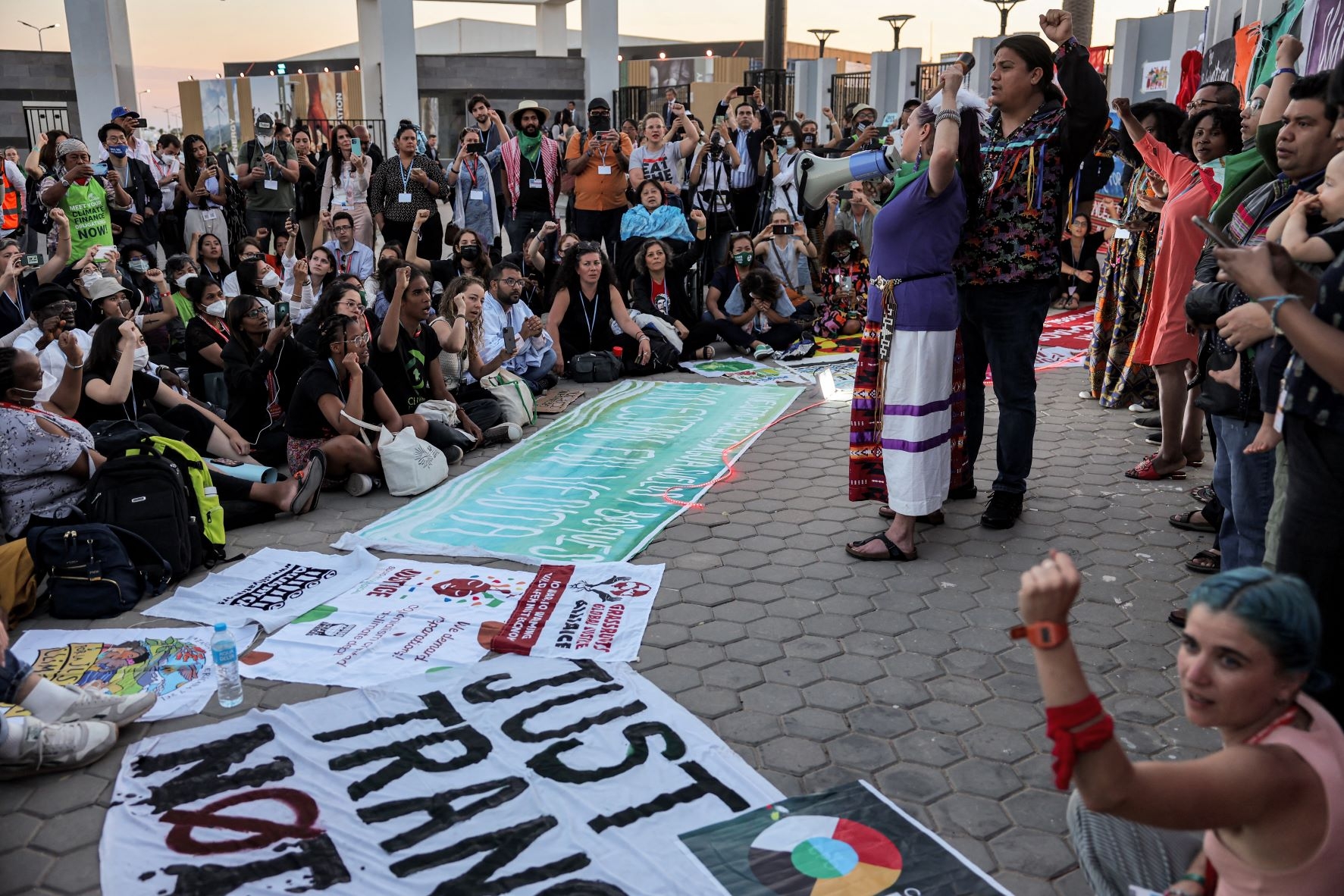
After two weeks and numerous delays and arguments, delegates to the Cop27 climate conference in Egypt finally managed to come to an agreement overnight on tackling the climate emergency.
However, environmental activists have reacted with disappointment to the deal, which failed to commit to serious measures to reach a 1.5 degree target for global temperature increases.
They also criticised a lack of strong language committing to a total fossil fuel phase out.
With the conference in Sharm el-Sheikh now over, Middle East Eye takes a look at the agreement and some of the issues, including the plight of Egypt's political prisoners, to have been thrown up by the event.
What was agreed?
New MEE newsletter: Jerusalem Dispatch
Sign up to get the latest insights and analysis on Israel-Palestine, alongside Turkey Unpacked and other MEE newsletters
The agreement only just came through, with the conference extended to Saturday and the EU threatening to walk out over the lack of serious commitments.
In the end, there was no consensus on further cutting emissions. The 1.5 degree target was reaffirmed, but nothing more.
Germany Foreign Minister Annalena Baerbock said further efforts were "stonewalled by a number of large emitters and oil producers" whose presence at the conference has been heavily criticised by campaigners.
European Commission Vice President Frans Timmermans said the EU was "disappointed" in the final result.
"What we have in front of us is not enough of a step forward for people and planet," he said.
"It doesn't bring enough added efforts from major emitters to increase and accelerate their emission cuts."
Alden Meyer, a policy expert at think tank E3G who has been to all but one Cop over the last 27 years, said there were concerns that the presidency had been reluctant to include ambitious language on emissions and fossil fuels.
"Clearly, they're acting in their own national interests, rather than serving as an honest broker in the presidency," he told AFP, adding that they had been hosting a "gas industry trade fair" in Sharm el-Sheikh.
The only real progress was the agreement to set up a "loss and damage" fund for the purposes of offsetting the damage to countries from climate-linked events like floods, drought and sea-level rise.
"The draft decision on loss and damage finance offers hope to the vulnerable people that they will get help to recover from climate disasters and rebuild their lives," said Harjeet Singh, head of global political strategy at Climate Action Network International.
Agreement on the issue came despite resistance from wealthy countries that were hesitant about being asked to shoulder the burden of the fund.
The Alliance of Small Island States (AOSIS), a group comprised of islands that face an existential threat from rising sea levels, said the loss and damage deal was "historic".
"The agreements made at Cop27 are a win for our entire world," said Molwyn Joseph, of Antigua and Barbuda and chair of AOSIS.
"We have shown those who have felt neglected that we hear you, we see you, and we are giving you the respect and care you deserve."
Alaa Abd el-Fattah and other prisoners
The plight of imprisoned British-Egyptian citizen Alaa Abd el-Fattah, as well as other political prisoners in Egypt, became another major feature of the conference.
The activist, who has spent eight of the past 10 years in jail on various charges, escalated a months-long hunger strike at the beginning of the conference and gave up drinking water to put pressure on Egypt to release him.
Meanwhile, Sanaa Seif, Abd el-Fattah's sister, took part in the conference to shed light on his ordeal and campaign for his release. Although he has not been released, he did eventually end his hunger strike, though his family said his health had "deteriorated severely".
One of the most dramatic moments in the first week of Cop27 was when an Egyptian MP was escorted by security out of a hall at the climate conference after heckling Seif while she was speaking on a panel.
Amr Darwish, a pro-government parliamentarian, was captured on video grabbing a microphone and assailing Seif and other speakers in Arabic before security intervened.
The campaign prompted world leaders taking part in the summit to show their support for Abd el-Fattah and call on Egyptian President Abdel Fattah el-Sisi to intervene to secure his release.
Last week, hundreds of human rights and climate activists chanted "free them all" and "no climate justice without human rights" in a protest at the summit, urging the release of Abd el-Fattah and other political prisoners.
Seif also led a protest march in the Blue Zone, with posters calling for the release of all political prisoners in Egypt. There are an estimated 65,000 political prisoners in the country, according to Egyptian rights groups.
Spying claims
Egypt came in for criticism for both its handling of the conference and wider human rights concerns.
Last week, Germany complained that the host country's security services had been surveying its activities, monitoring and filming events at the German pavilion at the conference in the resort city of Sharm el-Sheikh .
The German embassy in Egypt is reportedly the institution that lodged the complaint with Cairo and asked for the monitoring to stop.
Egypt denied the claims.
Activists harassed
There was also concern over the decision to harass climate activists and bar many of them from the conference.
Security forces detained Indian climate activist Ajit Rajagopal a week ahead of Cop27 as he was planning to walk 260km from Cairo to Sharm el-Sheikh to highlight the challenges of climate change.
Rajagopal's lawyer and friend, Makarios Lahzy, told Middle East Eye that he was interrogated and also detained when he went to see his client at the police checkpoint where he was stopped.
Security officials confiscated his phone and whisked him away to a local police station, he said.
"They asked me, what do you do professionally, and what's your relation to this environmental activist?" Lahzy told MEE.
Rajagopal had been holding a banner that read "March For Our Planet", in reference to the mobilisation of a march that set off within Africa and spread globally. After being treated like "criminals" for more than 24 hours, the pair were finally released.
Meanwhile, Ugandan environmental activist Nyombi Morris said he and other African climate justice campaigners were effectively denied participation at the summit due to the tight security restrictions.
"I am watching online because our observers' badges don't allow us to enter," he told AFP on the second day of the summit. "I'm like 'so, why are we here?'"
Morris said his dreams of an "African Cop" were shattered when he saw the security measures at the airport.
"I was so happy when they announced that Cop27 would be in Africa," said Morris, who founded the Earth Volunteers youth organisation to campaign for "climate justice".
"I thought maybe I would get a chance to be in the room where the negotiations are taking place."
Instead, "with the questions we received at the airport, it will not be easy for us to continue with our plan," the 24-year-old said.
Middle East Eye delivers independent and unrivalled coverage and analysis of the Middle East, North Africa and beyond. To learn more about republishing this content and the associated fees, please fill out this form. More about MEE can be found here.


